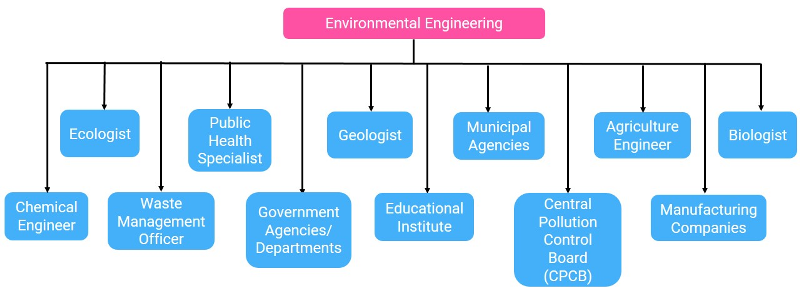

Environmental engineers apply combined methods of science and engineering to improve the environment so that people have access to healthy water, air and land suitable for human existence. It takes a quantitative and interdisciplinary approach to examine ecosystems. It covers conservation, biodiversity, soil contamination, groundwater contamination, climate change, water quality, waste management, sustainable development and natural resources, and air and noise pollution.
| Course | Eligibility | Duration |
|---|---|---|
| Diploma Course | Class 10 | 3 years |
| B.E/B.Tech | Class 10+2(PCM) +Entrance Exam | 4 years |
| M.E/M.Tech | B.E/B.Tech+Entrance Exam | 2 years |
| Post Graduation Diploma | B.E./B.Tech. | 1 year |
| PhD/Doctorate Course | M.E/M.Tech | 3 years |
J.E.E. or Joint Entrance Exam
GUJCET(Gujarat)
MHCET(Maharashtra)
GATE(Graduate Aptitute Test in Engineering)
Depending on the type of institute/quota/degree, fees can range from INR Thirty thousand to Two lakhs per year, excluding lodging and boarding.
Problem Solving Skills
Critical Thinking
Interest in Environment and Conservation
Time management skills
Leadership Skills
Coordination
Leadership quality
The following chart shows opportunities available for electrical engineers in various fields:

Chemical Engineer:Chemical Engineer derives safety equipment and guidelines for people working with hazardous chemicals.
Ecologist:Ecologist’s responsible for understanding the extent of the influence of human beings on nature and its consequences.
Waste Management Officer:The main focus of their job is to supervise the recycling and disposing of waste materials.
Public Health Specialist:A Public Health Specialist comes up with strategies to promote healthy living among people and conduct health surveys.
Geologist: A Geologist focuses on studying the evolution of earth and researching its natural resources. They estimate the running out time for resources.
Agriculture Engineerr: Agricultural Engineer focuses on increasing the efficiency of machinery and designing machinery used in agriculture.
Biologist: Biologists' responsibilities include researching the interaction among living organisms, data collection, and performing experiments related to behavior.
Central Pollution Control Board (CPCB):For an environmental engineer there are career options in the Central Pollution Control Board to control pollution.
Municipal Agencies:Environmental Engineer also gets employment in Municipal agencies as waste manager, pollution controller.
Manufacturing Companies:Environmental Engineers also get employment in manufacturing companies where the environment is a key concern and environment related projects are working.
Government Agencies/ Departments: For an environmental engineer there are career options in government agencies and departments where the environment process is carried on.
Educational Institute:For an environmental engineer there are career options in educational institutes as lecturer or professor in engineering colleges or universities.
Environmental Engineering
Environmental Engineering
Environmental Science and Engineering
Sarvajanik College of Engineering and Technology, Surat (http://scet.ac.in)
Government Engineering College, Valsad ( http://www.gecvl.cteguj.in)
Sardarkrushinagar Dantiwada Agricultural University, Banaskantha ( http://www.sdau.edu.in/Home/Index)
L.D. College of Engineering, Ahmedabad (http://ldce.ac.in)
Savitribai Phule Pune University, Pune (http://www.unipune.ac.in)
Rajiv Gandhi Proudyogiki Vishwavidyalaya , Indore (MP) (https://www.rgpv.ac.in)
P.E.S. College of Engineering, Mandya Pradesh (http://www.pescemandya.org)
Manipal Institute of Technology, Manipal (https://manipal.edu/mu.html)
Delhi Technological University, Delhi(http://dtu.ac.in)
Jamia Millia Islamia, New Delhi (https://www.jmi.ac.in)
B.M.S. College of Engineering, Bengaluru (https://bmsce.ac.in/home)
AECOM Technology Corporation
SPML Infra Limited
MACTEC
Sima Labs Pvt Ltd.
CH2M
Jacobs Engineering Group
Bechtel
Note:
All the students, teachers and guardians should note that the above mentioned websites and information on various colleges / universities may change under the rules and regulations of the education department.